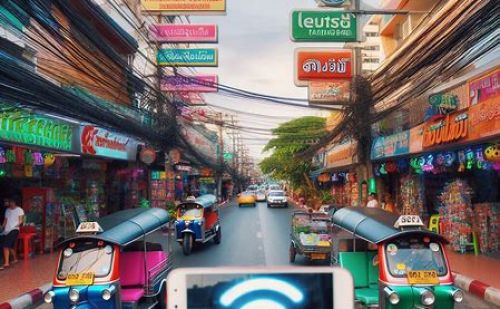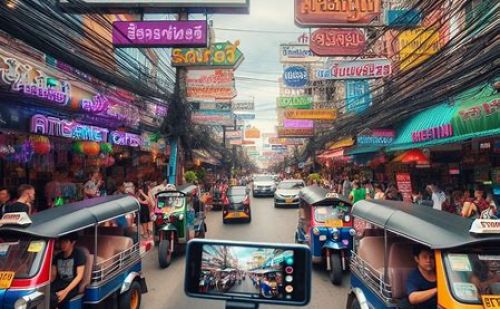Internet in Pattaya
Internet in Pattaya Thailand
According to the web search results, there are several options for internet service providers in Pattaya, such as Surf Internet, AIS, True, and Dtac. The median download speed for fixed broadband in Pattaya is 117.87 Mbps, and the median upload speed is 99.21 Mbps. You can also check the mobile network coverage for 2G, 3G, 4G, and 5G in Thailand on this map
Some factors that you may want to consider when choosing an internet provider are the speed, reliability, price, customer support, and availability of the service in your area. You can read some tips on how to choose the best internet provider in Thailand here
What is the cost of internet in Pattaya?
The cost of internet in Pattaya depends on the speed and the provider you choose. According to the web search results, the average price of internet 8 Mbps (1 month) in Pattaya is 539 ฿, and the average price of internet 300 Mbps (1 month) in Pattaya is 590 ฿. Some of the internet service providers in Pattaya are Surf Internet, AIS, True, and Dtac. You can compare their plans and prices on their websites.
What is the speed of internet in Pattaya?
According to the web search results, the median download speed for fixed broadband in Pattaya is 117.87 Mbps, and the median upload speed is 99.21 Mbps. The median mobile download speed in Pattaya is 44.69 Mbps. The speed of internet in Pattaya may vary depending on the provider, the plan, and the location you choose.
How do I check my mobile network coverage?
There are different ways to check your mobile network coverage in Thailand. One way is to use the nPerf app, which can show you the coverage map of 2G, 3G, 4G, and 5G networks in Thailand. Another way is to use the Kimovil website, which can help you check the compatibility of your phone with the frequency bands and operators in Thailand. You can also dial a code on your phone to check your network signal strength. For example, for AIS, you can dial *121#, for DTAC, you can dial 1019#, and for TrueMove H, you can dial #123#
What is the best mobile network in Thailand?
There is no definitive answer to which mobile network is the best in Thailand, as different networks may have different advantages and disadvantages depending on your needs and preferences. However, based on the web search results, some factors that you may want to consider when choosing a mobile network are:
Coverage: AIS is the best network in Thailand for coverage in tourist areas and also has the fastest 4G and 5G speeds. However, True Move and Dtac also have good coverage in most parts of the country
Price: True Move is slightly cheaper than AIS for prepaid plans, and Dtac is the cheapest among the three major operators. However, the price difference may not be significant, and you may find other deals or promotions that suit your budget better.
Data: All three networks offer unlimited data plans, but the speed may vary depending on the plan and the network congestion. You can also buy data packages that expire in a certain period of time, such as 7 days or 30 days, depending on your usage and travel duration.
Customer service: AIS has the best customer service among the three networks, according to some online reviews. True Move and Dtac also have customer service centers and hotlines, but they may not be as responsive or helpful as AIS.
Ultimately, the best mobile network for you may depend on your personal preferences and needs, such as how much you use your phone, where you travel, and how long you stay in Thailand. You can compare the plans and prices of the three networks on their websites or at their stores, and choose the one that suits you best.
How do I check my internet speed?
There are different ways to check your internet speed online. One way is to use Speedtest by Ookla, which can measure your download, upload, and ping speed. Another way is to use Fast.com, which can estimate your download speed from Netflix servers. A third way is to use Speedcheck, which can test your download, upload, and ping speed, as well as your internet quality. You can use any of these websites on your browser, or download their apps on your devices.
Benefits of the internet in Pattaya
The internet in Pattaya can offer you many benefits, such as:
Access to immediate information: You can use the internet to find any information you need, such as news, weather, travel, entertainment, education, health, and more. You can also use the internet to learn new skills, languages, or hobbies online.
Excellent form of communication: You can use the internet to communicate with your friends, family, or colleagues, no matter where they are. You can use email, instant messaging, video calls, social media, or online forums to stay in touch and share your experiences.
Dissemination of own content: You can use the internet to create and share your own content, such as blogs, videos, podcasts, photos, or music. You can also use the internet to showcase your talents, hobbies, or opinions, and reach a wider audience.
Business promotion: You can use the internet to promote your business, products, or services, and attract more customers. You can use websites, social media, online advertising, or e-commerce platforms to market your brand and increase your sales.
Ease of shopping and banking: You can use the internet to shop for anything you want, from groceries to clothes, from books to electronics, and more. You can also use the internet to pay your bills, transfer money, or manage your finances online. You can enjoy the convenience and security of online transactions.
Offers new forms of entertainment: You can use the internet to enjoy various forms of entertainment, such as streaming movies, music, or games, downloading e-books, or podcasts, or browsing memes, or funny videos. You can also use the internet to discover new cultures, places, or people, and have fun.
How do I stay safe online in Pattaya?
Staying safe online in Pattaya is important, as there may be some risks of cybercrime, fraud, or scams. Here are some tips on how to protect yourself online in Pattaya:
Use a VPN: A VPN (virtual private network) can help you encrypt your internet traffic and hide your IP address, making it harder for hackers, snoopers, or censors to access your online activities or personal data. A VPN can also help you access geo-restricted content or websites that may be blocked in Thailand
Avoid public Wi-Fi: Public Wi-Fi networks, such as those in cafes, hotels, or airports, may not be secure and may expose your online activities or personal data to hackers or snoopers. If you have to use public Wi-Fi, make sure you use a VPN and avoid logging into sensitive accounts or websites, such as your bank, email, or social media
Beware of phishing: Phishing is a type of online fraud where criminals try to trick you into revealing your personal or financial information, such as your passwords, credit card numbers, or bank details, by sending you fake emails, messages, or websites that look like they are from legitimate sources. To avoid phishing, never click on suspicious links or attachments, always check the sender’s address and the website’s URL, and use a reliable antivirus software to scan your device.
Use strong passwords: Passwords are the key to your online accounts and personal data, so you should make them as strong and unique as possible. A strong password should be at least 8 characters long, include a mix of uppercase and lowercase letters, numbers, and symbols, and not be easy to guess or related to your personal information. You should also use different passwords for different accounts and websites, and change them regularly. You can use a password manager to help you create and store your passwords securely.
What do people use the most on the internet in Pattaya?
According to the web search results, there is no specific data on what people use the most on the internet in Pattaya, but we can assume that they use it for similar purposes as the rest of the world. Some of the most common uses of the internet worldwide are:
Searching for information and web browsing: People use the internet to find any information they need, such as news, weather, travel, entertainment, education, health, and more.
Communication and collaboration: People use the internet to communicate with their friends, family, or colleagues, using email, instant messaging, video calls, social media, or online forums.
Entertainment: People use the internet to enjoy various forms of entertainment, such as streaming movies, music, or games, downloading e-books, or podcasts, or browsing memes, or funny videos.
Online shopping: People use the internet to shop for anything they want, from groceries to clothes, from books to electronics, and more. They can also pay their bills, transfer money, or manage their finances online.
Education: People use the internet to learn new skills, languages, or hobbies online, or to access online courses, tutorials, or resources for their studies.
Business promotion: People use the internet to promote their business, products, or services, and attract more customers. They can use websites, social media, online advertising, or e-commerce platforms to market their brand and increase their sales.
Earning online: People use the internet to earn money online, by working as freelancers, bloggers, influencers, or online tutors, or by selling their own products, services, or content online.








